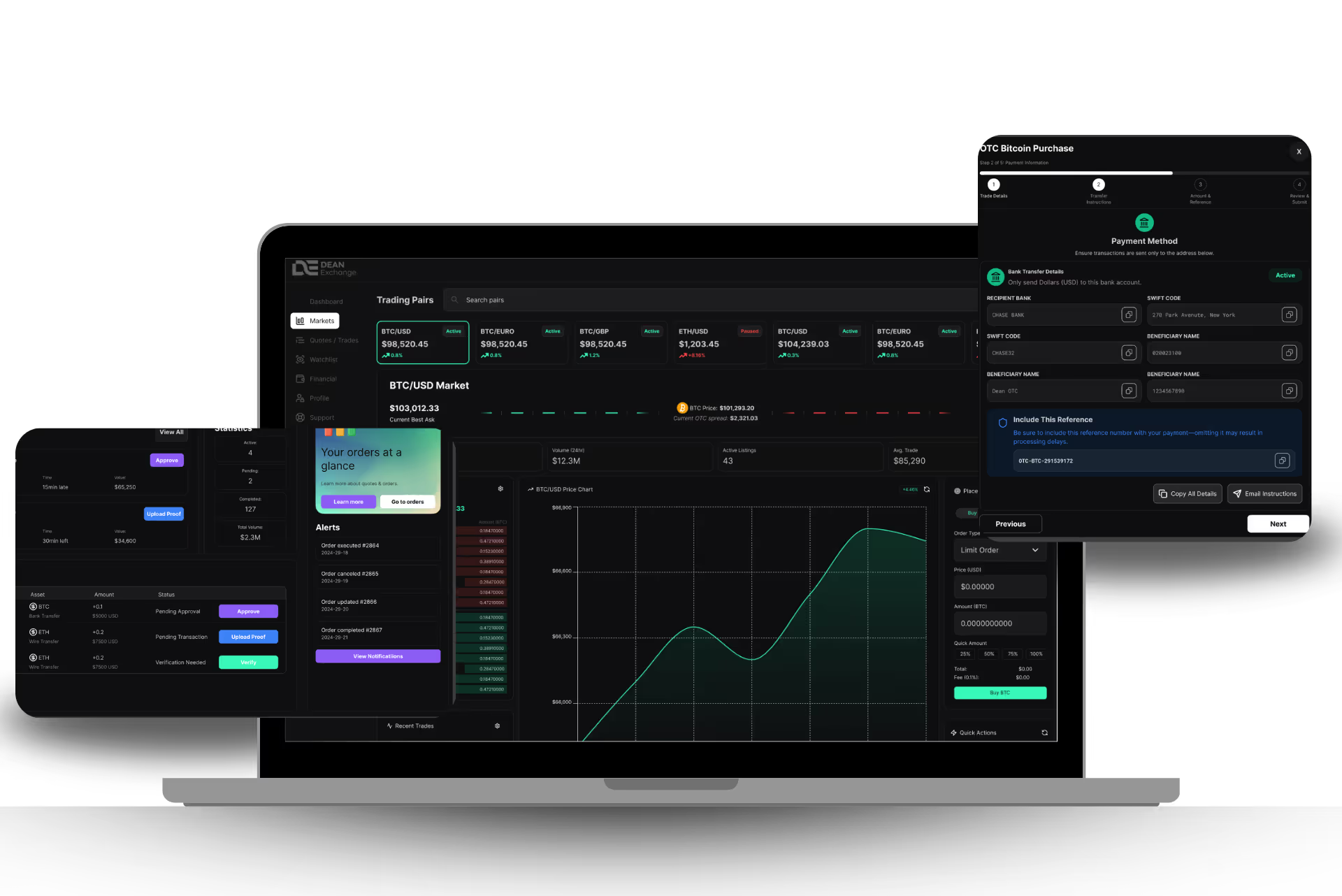By the
This is some text inside of a div block.
This is some text inside of a div block.
•
5
min read

As blockchain technology evolves, developers are at the forefront of building decentralized applications (dApps), smart contracts, and entire ecosystems. Whether you're creating a new DeFi platform, launching NFTs, or contributing to a decentralized exchange, having the right tools is essential for performance, scalability, and security.
This article outlines the most effective blockchain development tools in use today. We’ll break them down by category—smart contract frameworks, SDKs, node providers, testing environments, and debugging solutions—providing a clear roadmap for developers entering or expanding in the Web3 space.
At Dean Exchange, we equip blockchain engineers and builders with hands-on support, cryptocurrency tutorials, and live blockchain sessions that accelerate development and ensure you’re aligned with the latest crypto market trends.
Before diving into tools, it’s helpful to define what is blockchain development. Blockchain development involves creating decentralized applications and infrastructures that operate on peer-to-peer networks. Developers typically work with smart contracts, consensus mechanisms, token standards (like ERC-20 or ERC-721), and APIs that interact with on-chain data. This development requires specialized toolkits that differ from traditional web or mobile stacks due to the immutable and distributed nature of blockchain.
Smart contracts are the backbone of blockchain applications. These frameworks simplify the process of writing, testing, and deploying smart contracts securely and efficiently.
Hardhat is a popular Ethereum development environment designed to streamline local testing, debugging, and deployment.
Key Features: Built-in local Ethereum network for rapid development, Solidity stack traces for smart contract errors, Plugin ecosystem (e.g., Ethers.js, Waffle, TypeChain).
Why Use It: Hardhat is favored for its flexibility, strong community, and developer-friendly error reporting.
Truffle offers a full development suite including compilation, testing, and migration tools for Ethereum-based smart contracts.
Highlights: Integrated with Ganache for local blockchain simulation, Mocha/Chai testing support, Deployment to multiple networks.
Use Case: Ideal for projects that require rich testing libraries and integrated asset pipelines.
A fast-growing alternative written in Rust, Foundry offers fast compile times and scripting for Solidity developers.
Advantages: Lightning-fast build and test cycles, Script automation for deployments and simulations, CLI tooling for EVM-compatible chains.
Preferred By: Power users focused on performance and precision.
Software Development Kits (SDKs) and libraries help interface with blockchains, write transactions, and fetch data from the chain or dApps.
Both libraries enable interaction with Ethereum nodes from the frontend or backend.
Web3.js: Established standard with extensive documentation.
Ethers.js: Lightweight, more modular, and increasingly preferred by modern dApps.
Why Use Them: These SDKs abstract raw blockchain calls into cleaner JavaScript/TypeScript functions, reducing complexity.
For Solana-based development, Solana's Web3.js library and Anchor (a Rust-based framework) offer robust tools for interacting with the Solana runtime and writing high-performance programs.
Ideal For: Developers building in the Solana ecosystem who prioritize speed and low fees.
Polkadot.js provides a browser extension and full-featured API to connect with Polkadot-based chains and Substrate modules.
Use Case: Interacting with custom parachains and enabling multi-chain interoperability.
To interact with the blockchain, your application must connect to a node. Hosting your own node can be resource-intensive. Node providers offer scalable infrastructure so you can focus on development.
A go-to service for Ethereum and IPFS, Infura provides high-availability access to blockchain networks without maintaining your own node.
Features: Ethereum mainnet and testnet APIs, IPFS support for decentralized file storage, Integrated with Truffle, Hardhat, and MetaMask.
Alchemy delivers enhanced Ethereum infrastructure with additional debugging and performance monitoring.
Developer Benefits: Built-in analytics dashboard, Automated notifications for transaction statuses, Enhanced APIs for faster queries.
QuickNode supports multiple chains (Ethereum, BNB Chain, Polygon, Solana, and more) with enterprise-grade RPC services.
Why Use It: For multi-chain dApps that need speed, uptime, and robust analytics.
Simulating blockchain conditions before deployment is essential for catching bugs and optimizing gas usage.
Included in the Truffle Suite, Ganache is a personal blockchain for Ethereum development.
Use Case: Quickly test contracts, simulate accounts, and control block mining in a sandboxed environment.
Tenderly provides advanced testing, transaction tracing, and error reporting for smart contracts.
Developer Features: Real-time transaction monitoring, Stack trace debugging for Solidity, Gas usage simulations.
Why It’s Powerful: Integrates easily with Hardhat and streamlines DevOps for smart contract deployment.
Blockchain applications are immutable—making post-deployment debugging critical. These tools help audit, trace, and secure smart contracts before and after launch.
MythX: A cloud-based security analyzer for Solidity contracts.
Slither: A static analysis tool for Solidity with CLI reports and bug identification.
Use Case: Pre-deployment security checks and static analysis for vulnerability detection.
Remix is a web-based IDE for writing, compiling, and deploying Solidity contracts.
Why Developers Use It: Fast experimentation, Integrated static analysis tools, Easy deployment to testnets or injected Web3 environments (e.g., MetaMask).
Blockchain is a rapidly evolving space, and staying updated with the latest tooling, libraries, and patterns is vital. That’s where education and live support matter.
At Dean Exchange, we support developers at every stage—from foundational concepts to complex dApp deployments—through:
Cryptocurrency Tutorials: Step-by-step guides for Solidity, Web3 integration, smart contract design, and secure development practices.
Live Blockchain Sessions: Weekly sessions with engineers and industry leaders covering tooling updates, dApp architecture, and smart contract audits.
Tool Walkthroughs and Case Studies: Get familiar with using Hardhat, Alchemy, IPFS, and other tools through real-world projects and application demos.
Community Support: Join our developer Discord to get help with bugs, share insights, and stay informed about new crypto market trends.
Choosing the right blockchain development tools isn’t just about building faster—it’s about building smarter. From IDEs and SDKs to security and performance testing, the toolkits mentioned here are essential components of a professional-grade blockchain stack. Whether you're launching the next decentralized exchange, optimizing smart contract gas usage, or experimenting with Layer 2 protocols, having the right tools gives you the edge in Web3 development.
At Dean Exchange, we’re committed to helping you master these tools with expert instruction, practical demos, and ongoing support.
Level up your blockchain development—join Dean Exchange’s tutorials and live sessions to sharpen your skills and stay ahead in the decentralized future.


Join our newsletter for exclusive insights, breaking crypto trends, and learning opportunities—delivered straight to your inbox.